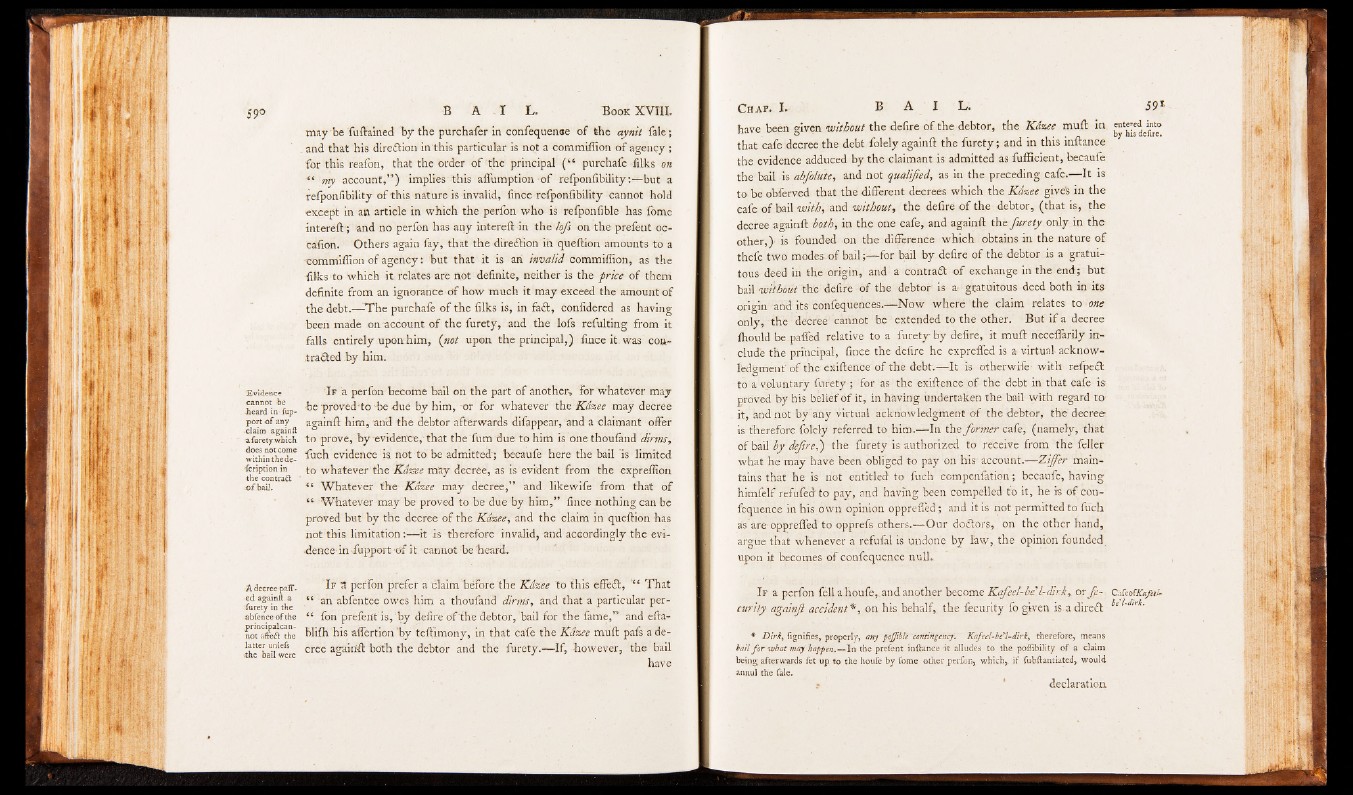
maybe fuftained by the purchafer in confequenae of the aynit fale;
. and that his direction inthis particular is not a commiflion of agency;
for this reafon, that the order of the principal ( “ purchafe filks on
“ my account,” ) impliesthis affumption of refponfibility:■—but a
refponfibility of this nature is invalid, fence refponfibility cannot hold
except in a» article in which the perfon who is refponfible has fome
intereft; and no perfon has any intereft in the lofs on the prefent oc-
cafion. Others again fay, that the direction in queftion amounts to a
-eommiflion of agency: but that it is ah invalid commiflion, as the
filks to which it relates are not definite, neither is the price of them
definite from an ignorance of how much it may exceed the amount of
the debt.—T h e purchafe of the filks is, in faCt, confidered as having
been made on-account of the furety, and the lofs refulting from it
falls entirely upon him, (not upon the principal,) fince it was contracted
by him.
I f a perfon become bail on the part of another, For whatever may
be proved'to be hue by him, or for whatever the iKdzee may decree
again!! him, and the debtor afterwards difappear, and a claimant offer
to prove, by-evidence,-that the Turn due to him is one thoufand dirms,
filch evidence is not to be admitted"; becaufe here the bail is limited
to whatever the Kdzee may decree, as is evident from the expreflion
“ Whatever the Kdzee may decree,” and likewife from that of
“ ‘Whatever may be proved to be due by him,” fince nothing can be
proved but by the decree of the Kdzee, and the claim in queftion has
not this limitation:— it is therefore invalid, and accordingly the evidence
in fupport -of it. cannot be heard.
Evidence
cannot be
heard in- fupport
o f any
.claim again ft
a furety which
does not come
within the de-
fcription in
the contract
o f bail.
A decree paired
againft. a
iiirety in the
abfenceof the
principalcan-
not affeft the
latter unlefs
vthe bail were
If a perfon prefer a claim before the Kazee to this effedt, That
“ an abfentee owes him a thouland dirms, and that a particular per-
“ fon prelent is, by defire Of the debtor, bail for the fame,” and efta-
blifh his affertionhy teft’imony, in that cafe the Kdzee muft pafs a decree
againft both the debtor and the furety.— If, however, the bail
have
have been given without the defire of the debtor, the Kdzee muft in,
that cafe decree the debt folely againft the furety ; and in this inftance
the evidence adduced by the claimant is admitted as fufticient, becaufe
the'bail is abfolute, and not qualified, as in the preceding cafe.— It is
to be obferved that the different decrees which the Kdzee give's in the
cafe of bail with, and without, the delire of the debtor, (that is, the
decree againft both, in the one cafe, and againft the furety only in the
other,)- is founded on the difference which obtains in the nature of
thefe two modes-of bail;— for bail by defire of the debtor is a gratuitous
deed ill the origin, and a contradt of exchange in the end; but
bail without the défi re of the debtor is a- gratuitous deed both in its
orioiff ahd its confequences.— Now where the claim relates to -owe
only, the decree cannot be extended to the other. But if a decree
Ihould be-paffed relative to a furety by defire, it muft neceflirily include
the principal, fince the defire he expreffed is a- virtual, acknowledgment’
of the exiftence of the debt.— It is otherwife with refpect
to-'-a voluntary furety ; for as' the exiftence-:of the debt in that cafe is-
proved by his belief óf it, in having undertaken the bail with regard to
it, ànd not byuny Virtual acknowledgment of the debtor, the decree
is therefore folely referred to him.— In ih t former cafe, (namely, that
of bail by dejirefi) the furety is; authorized to receive from the feller
what he may havé been obliged to pay on his- account.— Z iffe r maintains
that he is not entitled to fuch eompenfation; becaufe, having
himfelf refufed to pay, and having been compelled to it, he is of con-
fequence in his,own opinion oppreifed; and it is not permitted to fuch
as'are oppreffed to opprefs others.— Our dodtors, on the other hand,
argue that whenever a refufal is undone, by law,, the opinion founded,
upon it becomes of confequence null..
If a perfon fell a.houfe,, and anpther become Kafeel-bellrcBrk„ or fk-
curity againft accident*, on his behalf,, the fecurity fo given is.a diredt
* D irk , fignifies,. properly, any pojftblè ~contingencyi Kafeel- be ’i-âirky therefore, means
bail fo r wbat may happen.— In the prefent inftance i t alludes to the poffibility o f a claim
being afterwards fet up to the houfe by fome other perfon, which,., if fubftantrated, would
annul the fale.
entered into
by his defire.
CàfeofKafeiU
be'l-dirk.
declaration